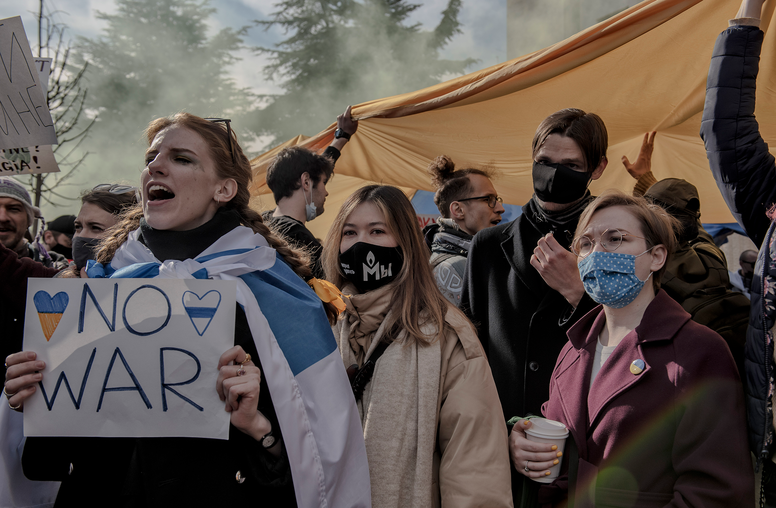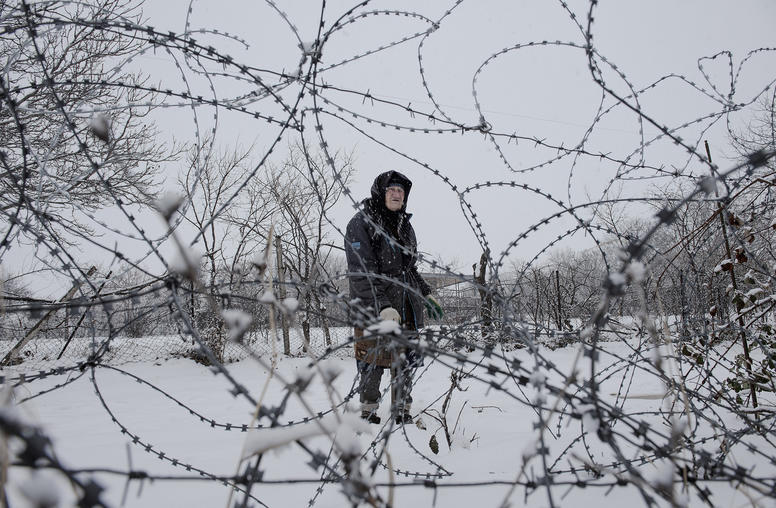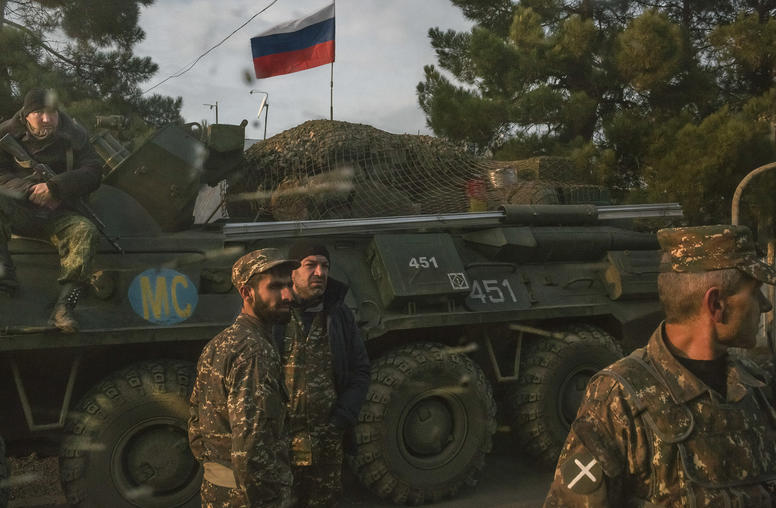Georgian President, at USIP, Says Reforms Must Follow Revolutions
Arguing that the popular uprisings of the past year reflect the global appeal of American values of freedom, Georgian President Mikheil Saakashvili, who led his own country’s 2003 “Rose Revolution,” told an audience at the U.S. Institute of Peace (USIP) on February 1 that the success of such revolutions requires sweeping reforms that aim for a complete “social transformation,” commence quickly and “never stop.”

Saakashvili dismissed talk of American decline, saying, “Despite the economic problems and the doubts about the future, 2011 has shown that the values on which America is based are on the rise.” He added, “Let’s not give in to pessimism, depression and relativism.”
Saakashvili spoke at an event that was co-hosted by USIP and the Atlantic Council and was webcast live.
At an Oval Office meeting with Saakashvili two days earlier, President Barack Obama praised Georgia’s “model of democracy and transparency that they’ve been setting not just for their own country but also for the region as a whole. And we think that with continued progress over the next several years that a lot of countries will say to themselves that if Georgia can perform these transformations, then we can as well.” Obama called a future free trade agreement with Georgia, a nation of 4.6 million people in the Caucasus, “a possibility” and reiterated U.S. support for Georgia’s goal of eventually becoming a member of NATO. Georgia has contributed combat troops to the U.S.-led fight against the Taliban and other militant groups in Afghanistan.
Obama cited Georgia’s progress on establishing the rule of law and respect for minorities but also signaled U.S. expectations that Georgia’s presidential election next year will be free and fair, and feature a “formal transfer of power.” Saakashvili is in his second term as president and is not permitted to seek another. Though Obama noted “enormous strides” made under Saakashvili’s leadership, the State Department and human rights groups have also criticized Georgian authorities for actions that have limited media freedom and punished political dissenters.
Most of Saakashvili’s remarks at USIP centered on Georgia’s extensive reforms and its efforts to attack corruption and build a democracy—and how that experience might suggest lessons for other societies, particularly those in the “Arab Spring,” that are trying to cast off authoritarian, corrupt political systems.
His appearance at the Institute followed the release of a World Bank report that singled out Georgia for “unique success in fighting corruption in public services.” Echoing some of Saakashvili’s own sentiments, the World Bank stated that “many of the ways in which Georgia implemented reform are replicable—including the development of a virtuous cycle of reforms that built early credibility for the government.” It noted the “critical importance of top-level political will” and argued that “only a comprehensive approach like Georgia’s multifront assault on corruption may be viable.”
Said Saakashvili, “The cliché that some cultures, people or regions are inherently corrupt or allergic to transparency has been proven absolutely wrong in my country.”
More broadly, Saakashvili said that “the real revolution occurs after the cameras” from international television networks leave the country. “Only a whole-of-government and whole-of-society approach to reform can bring tangible and enduring results,” he said. “You need to put your popularity at risk right away….After a revolution, people feel empowered and impatient. They want quick results. And once they become disillusioned and cynical, you have lost the opportunity for change.”
“When you are carried to power by popular uprising, the greatest risk you face is your own inaction—the temptation to temporize in order to enjoy your original popularity,” he said.
Saakashvili also discussed efforts to embed post-revolutionary change deeply in Georgian society. “Our ambition was clear: to give the people the sense that they own their state,” he said. Saakashvili referred to a “mental revolution” as “the main achievement of the last eight years”: “Today, Georgians have totally changed the way they think—of themselves, of their prerogatives, of their responsibilities and of their relationships to society and government.” At the same time, he acknowledged, “We are still very much a work in progress.”
He described the Georgia of 2003 as “an utterly failed state,” with an empty treasury, electricity shortages, regional warlords and rampant crime and corruption. Calling corruption “a virus that had infected all of our institutions, rotting and crippling them,” he pointed to elements of a “full frontal assault against corruption.” In Georgia’s case, they included laying off 16,000 traffic police to stem extortion, firing tax collectors, simplifying the tax system and creating a single, merit-based admissions test for the nation’s universities. In addition, Saakashvili said his government had sought to lower tensions among religious, social and ethnic groups by embracing “multiculturalism and differences,” including affirmative action programs and efforts to decentralize government and empower local authorities.
“There was no ‘freedom textbook’ for us, and there is no textbook for our friends,” he said. “We cannot foresee which of these movements will produce Jeffersons, and which ones will produce Vladimir Lenins or Khomeinis.”
Saakashvili contrasted what he termed as the “panic and outrage” reaction to the Arab Spring of Russian leaders, namely Prime Minister Vladimir Putin, with the response of Turkey’s Prime Minister Recip Tayyip Erdogan. He said Erdogan is siding with freedom and “decides to embrace the evolutions of the world,” while Putin “desperately tries to hold up the progress of history.”
Relations between the Georgian and Russian governments remain tense after their brief but bloody 2008 war, and they remain at odds over two disputed, breakaway territories that the U.S. government recognizes as parts of Georgia: South Ossetia and Abkhazia. Russian officials routinely voice a continuing antipathy for Saakashvili.
For his part, Saakashvili took note of the recent popular protests in Russia in support of clean elections and reforms. “They are looking at us very carefully,” he said of Russians’ interest in Georgia’s post-revolutionary experience. “That change [in Russia] may not be as far away as people think.”



